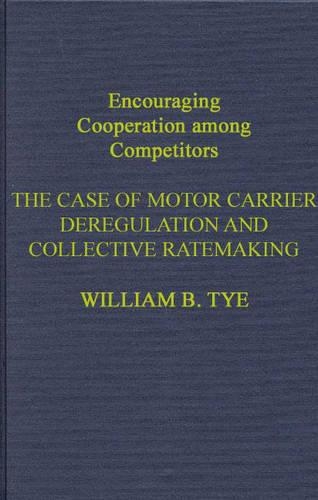
Encouraging Cooperation Among Competitors: The Case of Motor Carrier Deregulation and Collective Ratemaking
(Hardback)
Publishing Details
Encouraging Cooperation Among Competitors: The Case of Motor Carrier Deregulation and Collective Ratemaking
By (Author) William Tye
Bloomsbury Publishing PLC
Praeger Publishers Inc
4th June 1987
United States
Classifications
Tertiary Education
Non Fiction
388.3240973
Physical Properties
Hardback
213
Description
Collective ratemaking in the motor carrier industry is undoubtedly one of the most poorly understood issues in the literature on economic regulation. While strongly held opinions are commonplace, real knowledge of the collective ratemaking process and of how trucking tariffs are constructed is scarce. William Tye closes this gap in our knowledge with the most comprehensive study yet of the effects of the Motor Carrier Act of 1980 on competition on the trucking industry.
Reviews
Tye, a principal of a consulting firm in Boston, has studied what economists often ignore: the facts and institutions of a market. Based on economic evidence in the trucking industry under post-1980 deregulation (numbers of firms and truckers, entry and exit of firms, independent action on price setting, and the flexibility of prices), the author concludes that collective rate making through rate bureaus' is an efficient way of organizing the market, not a method of controlling price(s) in a collusive manner. . . . This study supports the basic and complementary economic propositions that for monopoly power to exist there must be control over supply (entry), and even collective price leadership (and list prices) may be barometic (vice collusive) and not price fixing' of the sort condemned by antitrust laws. This study is differentiated from other trucking studies (often in journal articles) by its attention to the facts of the industry. . . . The audience is wide, including undergraduates with only a smattering of economics, as well as policymakers, lawyers, and interested citizens.-Choice
"Tye, a principal of a consulting firm in Boston, has studied what economists often ignore: the facts and institutions of a market. Based on economic evidence in the trucking industry under post-1980 deregulation (numbers of firms and truckers, entry and exit of firms, independent action on price setting, and the flexibility of prices), the author concludes that collective rate making through rate bureaus' is an efficient way of organizing the market, not a method of controlling price(s) in a collusive manner. . . . This study supports the basic and complementary economic propositions that for monopoly power to exist there must be control over supply (entry), and even collective price leadership (and list prices) may be barometic (vice collusive) and not price fixing' of the sort condemned by antitrust laws. This study is differentiated from other trucking studies (often in journal articles) by its attention to the facts of the industry. . . . The audience is wide, including undergraduates with only a smattering of economics, as well as policymakers, lawyers, and interested citizens."-Choice
Author Bio
WILLIAM B. TYE is a Principal of Putnam, Hayes & Bartlett, Inc., an economics and management consulting firm which specializes in antitrust and regulation.
